Category D: Marketing
Responsible marketing policies, compliance and spending (20% of overall score)
Category D has three equally weighted criteria:
-
D1
Marketing policy
-
D2
Marketing to children
-
D3
Auditing and compliance
To perform well in this Category, companies should:
- Establish and implement a responsible marketing policy covering all consumers.
- The marketing policy should be comprehensive in its scope, i.e. considering all media channels and should embrace the principles of the International Chamber of Commerce (ICC) general marketing code, as well as the Framework for Responsible Food and Beverage Marketing Communications.
- Establish and implement a marketing policy that explicitly covers responsible marketing arrangement for children, including channels, location/settings (like schools) and type of products.
- Companies should commit not to market any unhealthy products to children and teens below the age of 18.
- Commission or participate in industry-level independent audits to assess compliance with marketing policies, as well as disclosure of individual results for all types of media.
Context
Rates of obesity and diet-related chronic diseases in India are rapidly rising. According to a recent study that forecasted prevalence using survey data, the number of overweight people will more than double and the number of obese people could triple between 2010 and 2040 to reach a prevalence of overweight and obesity of 30.5% by 2040. At the same time, the latest National Family Health Survey 2019-20 (NFHS-5) indicated a decline in nutritional status of children under 5 years, and anemia among women remains a major cause of concern. In this context, companies can support consumers in making healthy choices by marketing their products responsibly and prioritizing the marketing of healthier products over energy-dense, nutrient-poor foods and beverages.
There is evidence that marketing of unhealthy food negatively impacts food choices, dietary patterns, and health. It is widely agreed by researchers and child advocates that children need special consideration with respect to marketing (see pop out box) because they are unable to fully understand the persuasive intent of advertisements. Although studies on the impact of food and beverage companies’ marketing practices in India are limited, in 2017, a study which surveyed 560 adolescents (age 10-18 years) in Pune in Maharashtra State shows that marketing strategies, such as repetition of messages, brand image, celebrity endorsements and other techniques were associated with negative changes in food choices.
In addition, India’s rapidly changing demographics and lifestyles are impacting dietary patterns. After China, India has the world’s highest number of internet users, with around 570 million internet users in 2019, growing at a rate of 13 per cent annually. The expansion of mobile internet access and growing connection speeds had led to a growth in demand for digital media, with concerns about increase screen times for children during COVID-19 related lockdowns . The World Health Organization (WHO) has urged countries worldwide to monitor the exposure of children and teens to digital marketing, while the Food Safety & Standards Authority of India (FSSAI) is studying advertisements in television and other media targeted at children of foods high in fat, sugar and salt.
In India, marketing practices among food and beverage manufacturers are, to some degree, regulated, for example to protect consumers from false and misleading claims. In November 2019, FSSAI proposed a regulation to forbid foods high in fat, salt and sugar (HFSS) from being sold in food school canteens and within 50m of school campuses. As of September 2020, this regulation has been finalized as the Food Safety and Standards (Safe food and balanced diets for Children in School) Regulations, 2020. The regulation also prohibits advertising HFSS foods to children in school premises or within 50m of school campuses.
In support of government efforts, Indian food and beverage companies should adopt responsible marketing practices and ensure they commission independent audits to guarantee compliance and transparency. ATNI’s research in this Category D on marketing has been simplified to three criteria instead of four in the previous Index. To place higher emphasis on companies’ commitments to protect children from harmful or misleading marketing practices, new indicators have been included. These new indicators include one on companies’ commitment to clearly display the company or brand name when advertising in virtual media, and another indicator on marketing arrangements related to age thresholds and tools like age screening used in digital settings. In addition, criterion D2 has expanded its scope to include children of all ages under the age of 18 in order to align with recent changes made in the ICC Code for responsible marketing to children which now includes teens (Article 18 – ICC Advertising and Communication Code).
Compared to the first India Index published in 2016, some companies have demonstrated enhanced commitment to responsible marketing by adopting their own policies or adhering to codes developed by organizations such as The Advertising Standards Council of India (ASCI) or the stronger consolidated ICC Code.
How is food marketing affected and relevant in the COVID-19 crisis?
- The COVID-19 pandemic and associated measures have impacted the diets of millions of Indians. In the early stages of the pandemic, some regions showed demand for packaged foods and online grocery services had significantly increased compared to pre-COVID-19 levels. In response, food and beverage companies’ have adjusted their supply chains, production priorities and marketing strategies.
- A survey conducted in May-June 2020 with parents of school-age children revealed that screen time for Indian children 5 to 15 years has increased by 100 percent since the first lockdown. Changes in livelihoods and lifestyles, including lockdown measures, could significantly worsen childhood obesity. As highlighted in ATNI’s report on the impact of COVID-19 in India, none of the companies researched by ATNI for this report include a statement on their websites reiterating any commitment to responsible marketing to children during the pandemic. ATNI urges companies not to relax existing marketing commitments and recommends that they continue to prioritize marketing of healthier products, particularly to children (see above).
- With raised awareness on health and diet-related risk factors for COVID-19, consumers have become more interested in health and wellness. Demand for so-called ‘immunity- boosting’ products has boomed, with many manufacturers launching new products with functional (bioactive) ingredients like turmeric. Claims made in advertisements during and beyond the pandemic should be evidence-based.
- In the context of COVID-19, food and beverage manufacturers in India have an opportunity to build upon and strengthen their responsible marketing practices, especially those targeting children in the digital space. This can be achieved through companies’ marketing practices to make healthier products, including those that are fortified, more desirable for Indian citizens.
The India Spotlight Index 2020 research did not include indicators to score and rank companies’ responses to the COVID-19. But ATNI did talk to companies about their initial coping strategies and responses to the pandemic between March and June 2020 and ATNI has been tracking publicly available information on industry’s response globally to the COVID-19 crisis, including in India, and reported on trends, best practices and areas of concern in separate reports. Read more about how companies can positively contribute to addressing the global nutrition challenges in ATNI’s COVID-19 Project.
ATNI Covid-19 ProjectMain messages
- Overall, seven out of 16 companies have a policy for responsible marketing, and six published it in full detail: Nestlé India, Hindustan Unilever, Mondelēz India, PepsiCo India, Coca-Cola India, and Britannia Industries. The same six companies have some policy for responsible marketing towards children and/or support the Food and Beverage Alliance of India (FBAI) pledge .
- With a new marketing policy, Britannia Industries shows the greatest improvement in this thematic Category, increasing its score from 0.8 in 2016 to 5.3 out of 10 in 2020. It is the only Indian-headquartered company that has codified some commitments towards responsible marketing to children. For example, the company commits to only selectively market products to children which meet the company’s own nutrition criteria.
- Nestlé India is the only company that commits not to direct any marketing communications to children in and near primary schools; however, the commitment near the school settings is limited to specific product categories, such as confectionery or sugar-sweetened beverages. Mondelēz India is the only company that makes a global commitment to prohibit all advertising and any type of commercial messaging in primary and secondary schools. There is no commitment from any of the companies not to market any product in nor near secondary schools. Britannia Industries does commit to only marketing/advertising ‘healthy’ products in (or near) primary and secondary schools in agreement with schools/parents.
- Five companies: Nestlé India, Mondelēz India, Hindustan Unilever, PepsiCo India and Coca-Cola India, audit compliance with their responsible marketing policy. Nestlé India was the only company to audit its compliance with its policy in India for all groups, including marketing to children. Furthermore, Nestlé India discloses its 2019 auditing results online showing best practice.
- ATNI’s Product Profile study undertaken in collaboration with The George Institute for Public Health, found that out of all products (1,456) analyzed for all Indian companies combined, 16% met the healthy threshold. An additional and unscored Product Profile analysis indicates that only 12% of 1,495 products assessed, were eligible to be marketed to children according to the World Health Organization South East Asia Region (WHO SEAR) nutrition criteria. These findings underline the importance and need for more companies to adopt responsible marketing to children policies, particularly in accordance with the FSSAI order restricting the sale of HFSS foods in schools and prohibiting sale and advertisement within 50m of a school campus.
- Overall, the Indian subsidiaries of companies assessed in ATNI’s Global Index align their responsible marketing policies and practices in India with those of their parent companies. Similar to 2016 findings, some of the Indian-headquartered companies are ASCI members but very few companies mention that they adhere to its principles.
Novelties and best practices
Britannia Industries releases new Marketing Communications Policy
Since the last Index in 2016, Britannia Industries has adopted its Britannia Marketing Communications Policy through which the company commits to market its products responsibly to all consumers, including specific references to responsible marketing to children. Britannia Industries is the only India-headquartered company to have its own responsible marketing policy. Furthermore, it is the only India-headquartered company to commit to only market products meeting its own healthy standards in and near primary and secondary schools.
Nestlé strengthens it marketing commitments globally and performs audit in India
According to Nestle’s documents, its marketing expenditure rose 18.5 percent year-on-year to ₹4.7 billion in the first half of 2019. Therefore, it is essential that the company adheres to its responsible marketing policy and is transparent about its auditing results so that stakeholders can hold the company to account. Nestlé India’s global Marketing Communication to Children Policy was updated in 2018. The company commits to using only responsible techniques in marketing aimed at children below the age of 12 and restricts its advertising on all media where 25% or more of the audience is of that age group. Nestlé also commits to not direct any marketing communications to children in primary schools, nor near school campuses for product categories such as confectionery or water-based sweetened beverages.
Nestlé India shows industry best practice by commissioning an independent audit of compliance with its marketing to children policy. The audit from 2019 is available in the public domain and covers all forms of advertisement and media (including point-of-sale visits), showing individual compliance levels above 90%. The company also commissioned a survey across 50 primary schools in 12 states to assess whether there was any evidence of Nestlé branded material within Indian primary schools.
D1 Marketing policy
Category results show that six out of 16 companies – Coca-Cola India, Mondelēz India, Nestlé India, PepsiCo India, Britannia Industries and Hindustan Unilever – have responsible marketing policies aimed at all consumers, see Table 1. Five out of these six companies, except Britannia Industries, implement policies in India that were developed by their global parent companies. Britannia Industries is the only India-headquartered company to have its own responsible marketing policy. For the most part, companies’ policies adhere to the ICC Code, an industry best practice. This code is a globally-applicable self-regulatory framework developed by industry sectors worldwide.
Although the research did not find evidence of ITC having a marketing policy, the company states in its Food Product Policy, which is available online, that it adheres to the ASCI Code for Self-Regulation in Advertising. The code provides a commitment to honest advertising and to fair competition in the market-place. The ASCI code is aligned with the principles of the ICC Code and ITC’s commitment was credited accordingly.
Overall, little progress in this Category D1 of the Index (Marketing Policy) is observed compared to results from the previous India Index in 2016. Britannia Industries is the only company that demonstrates improvement by adopting a new marketing and communications policy.
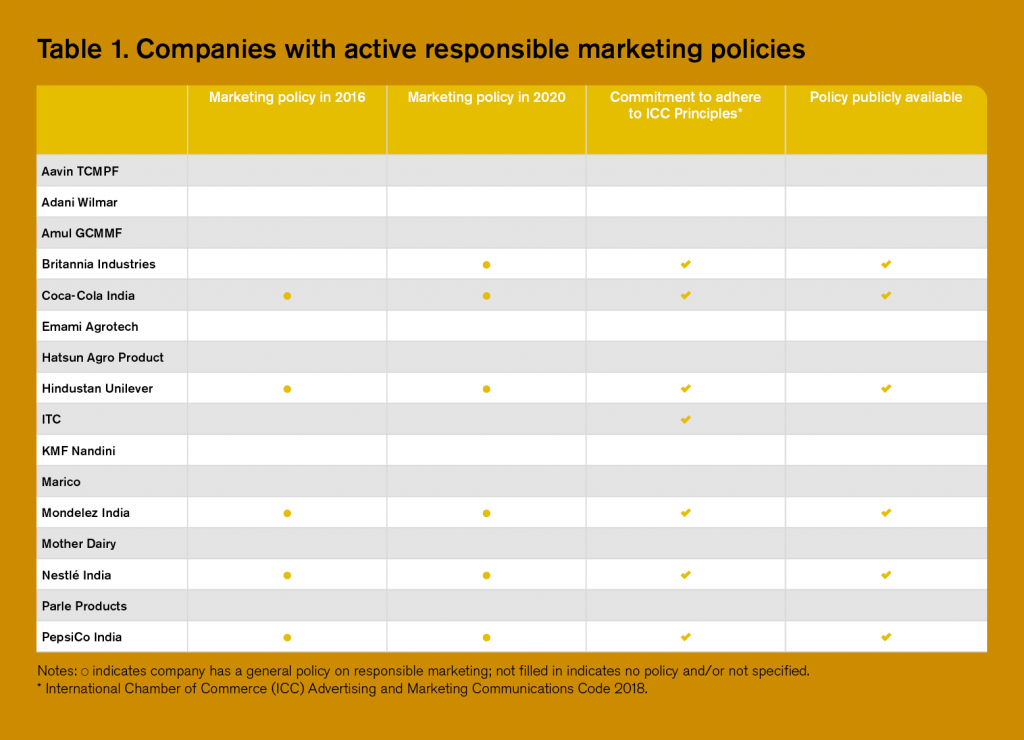
Overall, the media channels covered by the companies that have adopted a marketing policy or that at least make a commitment related to responsible marketing (like ITC) are similar. Table 2 shows that the biggest gap in channels covered is ‘additional forms of media’, which includes, for example, cinema, outdoor events, sponsorship, product placement in movies, TV shows, online games and apps).
Only two out of six companies that have a responsible marketing policy, Hindustan Unilever and Nestlé India, apply their commitments to all media channels.
To improve and accelerate their efforts to support all Indian consumers, especially children and teenagers, to make healthy choices, food and beverage manufacturers in India are encouraged to:
- Develop and implement a responsible marketing policy for all consumers, including specific arrangements for children and teens up to 18 years old. The policy should adhere to the ICC principles, and respect or go beyond compliance with Indian regulations.
- Ensure marketing approaches explicitly cover all relevant media, including non-traditional channels such as product placements and social media.
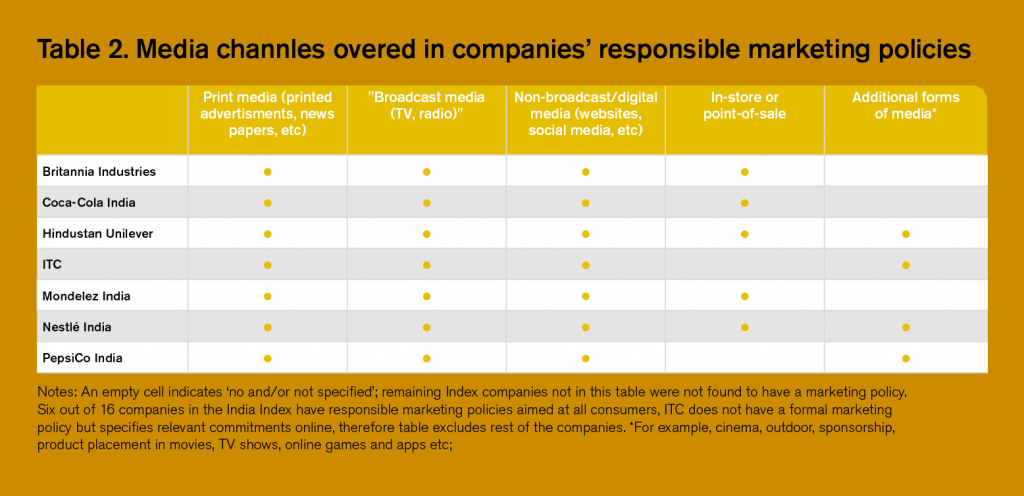
D2 Marketing to children
Limited progress was found regarding Indian food and beverage companies adopting responsible marketing policies towards children. At the time of research and engagement with companies (in 2019), little regulation on marketing to children was implemented. Table 3 shows that, overall, only 6 companies have adopted responsible marketing to children policies and or commitments.
Since 2016, Britannia Industries was the only company that has implemented a new policy. In its ‘Britannia Marketing Communications Policy,’ the company commits to “only selectively market products to children which the Company qualifies as having requisite nutritional content which is good for consumption by children.”
In addition, Britannia commits to only market products meeting its own healthy standards in and near primary and secondary schools. All the multinational companies with headquarters outside India adopt their global practices or commitments in India, and they are also signatories of the FBAI Pledge.
Audience thresholds are used by companies to restrict advertising on measured media to avoid inappropriately reaching younger age groups. Index results show that most companies have set the threshold at 35%, meaning they will restrict their practices in medium where 35% of more of the audience is of the restricted age group. Nestlé India is the only company that has defined a lower threshold, at 25%.
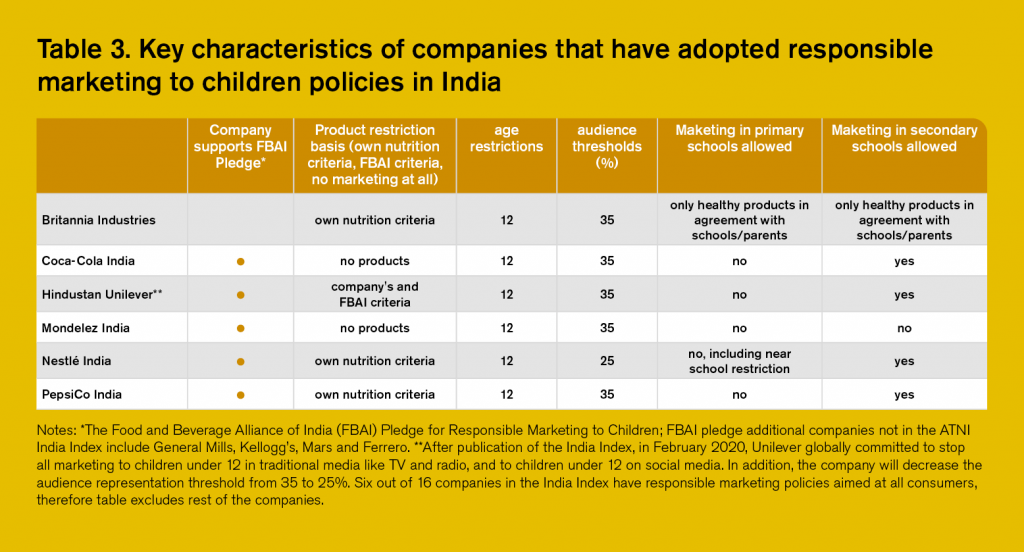
Table 4 shows that significant gaps remain regarding companies’ practices towards ensuring their digital media marketing and advertising are not targeted at children. For example, Index results revealed that only two out of the six companies, Mondelēz India and Nestlé India, have a responsible policy for marketing to children using age screening tools prior to logging or registering on websites.
Most of the companies have tools to ensure the design of their websites and the third-party sites they chose to advertise do not appeal or target predominantly children under 12 years old. Companies are encouraged to continue strengthening and monitoring their marketing practices in the digital media. Companies that have not yet adopted responsible marketing practices and/or policies covering children must include digital media when designing and implementing such policies.
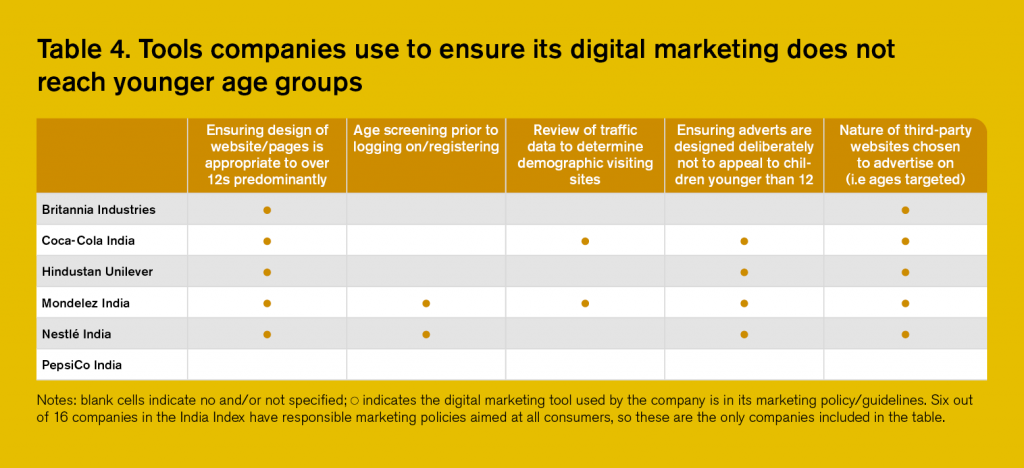
To improve and accelerate their efforts to support all Indian consumers, especially children and teenagers, to make healthy choices, food and beverage manufacturers in India are encouraged to:
- Adopt a responsible marketing policy with special arrangements for children and teens and publicly disclose their commitments to ensure stakeholders can hold the company to account.
- Ensure marketing approaches explicitly cover all relevant media i.e. traditional and digital channels including social media. Companies must adopt tools to ensure the websites, sponsorships, third-party sites, etc., do not appeal or target predominantly children and teens under 18 or only include healthy products.
- Companies must do as much as they can to avoid the marketing and provision of branded materials in primary and secondary schools in support of the new FSSAI (Safe food and healthy diets for school children) regulation banning the sale of HSSF products and within 50 m of school campuses. Companies can expand their commitments on marketing to children and teens to include places where children typically gather, i.e. public parks and sport facilities.
D3 Auditing and compliance
ATNI assesses companies’ public commitments and evidence of performing accordingly by assessing whether third-party audits of their marketing practices are in place and results are disclosed publicly. At present, ATNI does not have the means to assess companies’ marketing practices directly.
Results show that only four out of six companies – Coca-Cola India, Hindustan Unilever, Mondelēz India, and PepsiCo India – have responsible marketing policies covering all consumers as well as specific arrangements for children. These same companies have auditing practices in place for all audiences.
The International Food & Beverage Alliance (IFBA), of which some companies in this Index are members, commissions Accenture to conduct annual, global audits of TV, print, radio and internet advertising. However, India specific results are not published. Table 5 shows that that the only company that commissioned an independent, third-party audit covering all relevant forms of media for marketing to children is Nestlé India.
Five out of 6 companies report having response mechanisms for corrective action regarding their marketing practices. For example, in its new Marketing Communications, Policy Britannia Industries states its commitment to “undertake internal audits (annually or more frequently, if required) on marketing practices covering all audiences including children and/or teens, and, wherever required, corrective action will be taken.”
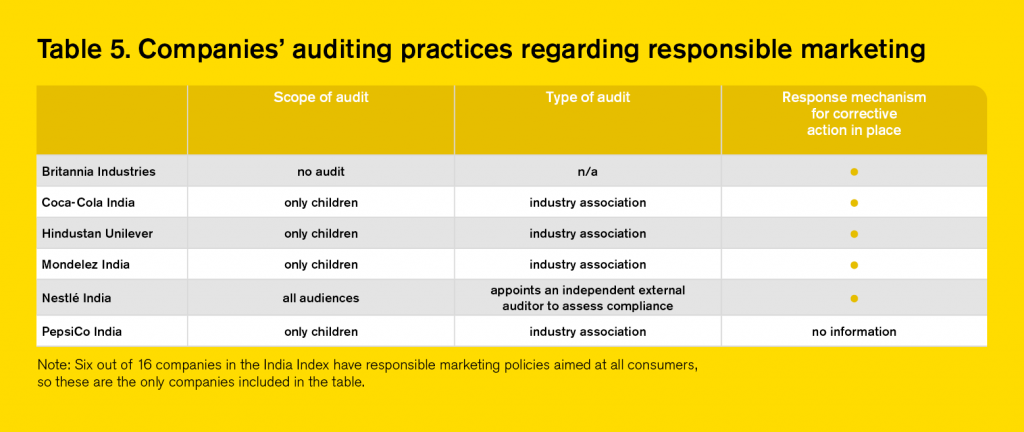
To improve and accelerate their efforts to support all Indian consumers, especially children and teenagers, to make healthy choices, food and beverage manufacturers in India are encouraged to:
- Audit compliance with its policy in India covering all audiences, including children and teens.
- Appoint an independent external auditor to assess compliance with its policies or take part in an auditing process of an external body (not industry association) undertaken by independent company.
- Annually assess compliance of all aspects of marketing covering all audiences to the same standards that are applied in assessing compliance for children and teens.
Products found suitable to be marketed to children
The Product Profile is an independent assessment of the nutritional quality of companies’ product portfolios undertaken by analyzing the levels of fat, salt, sugar, and other components within individual products. ATNI commissioned an independent research organization, The George Institute for Global Health, to undertake the nutrition profiling element of the Product Profile.
Similar to the process of the previous India Spotlight Index, two sets of results are generated for each company: one to determine the nutritional quality of the company’s products, by applying the Health Star Rating (HSR) both at the Category and portfolio level, and another by using the WHO South-East Asia Region (SEAR) regional standard to determine what percentage of products are suitable to be marketed to children. The latter system is used to examine, on average, what percentage of companies’ portfolios are suitable to be marketed to children. The WHO SEAR model was published in 2016 and was used for the first time in the India Index Product Profile 2020. See a comparison of the HRS and WHO SEAR models.
This assessment did not investigate whether these products are in practice marketed to children and teens by the companies in scope. Instead, it provides an extra indication of the healthiness of the company’s portfolios by checking whether the products, in theory, would be suitable to be marketed to children using the WHO nutrient profiling models. If companies are found to have a small number of products suitable to be marketed to children, it is of high priority that they implement responsible marketing policies to ensure these products are not undermining children’s health.
Importantly, this assessment does not impact companies scoring in the Index, as the Product Profile results utilizing the HSR system are integrated in Category B. This assessment provides an additional perspective on the healthiness of companies’ portfolios but it is not an indication of actual marketing practices and performance in relation to healthy/unhealthy products.
A maximum of five best-selling product categories for each company were analyzed in this assessment, based on their estimated Indian retail sales in 2018. Details on the scope of this assessment are provided in Table 6 below.
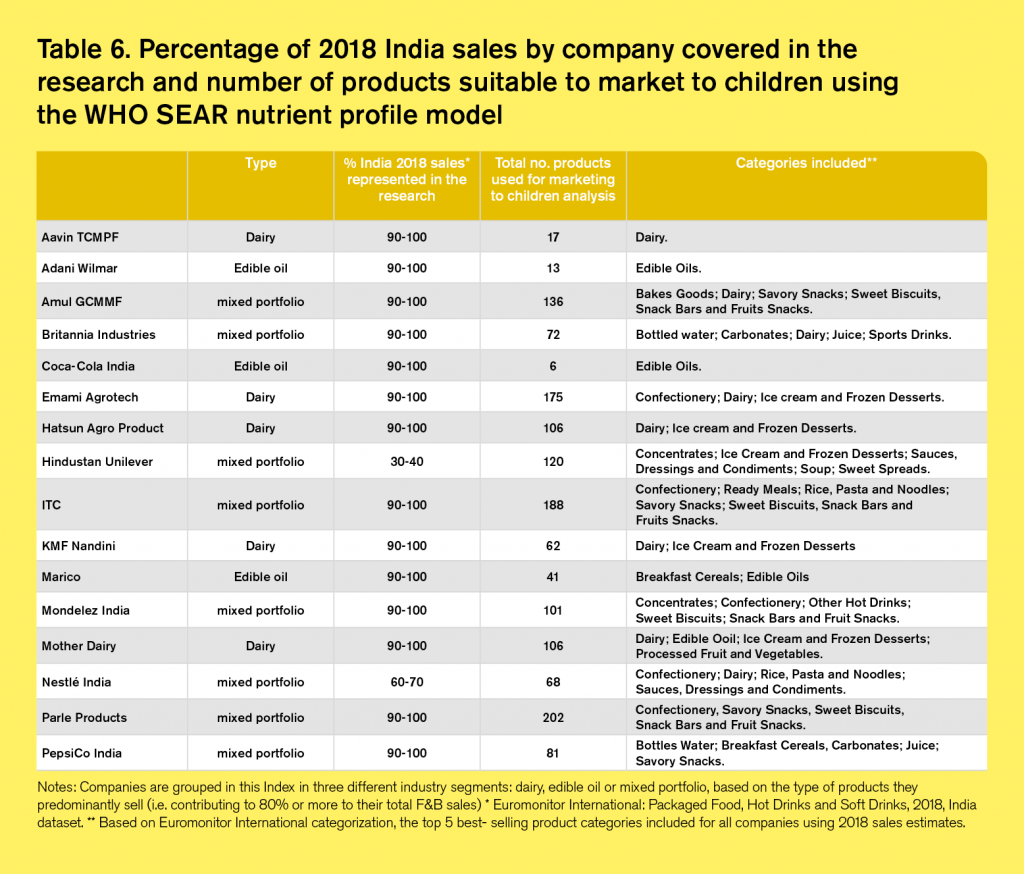
Overall, only 12% (183 out of 1,494) of products included in the analysis for all companies combined were found to be suitable to be marketed to children according to WHO SEAR criteria. This proportion is lower compared to Category B Product Profile results, which shows 16% of products meet the HSR ‘healthy’ criteria. This lower result reflects the more stringent criteria applied for eligibility to market to children, as entire categories are ineligible under the WHO SEAR criteria, whereas the HSR uses a cut-off point to determine healthiness.
Mondelēz India and Parle Products, had no products in the research eligible for marketing to children at all, showing that it is essential for them to implement and audit its responsible marketing policies and commitments in India.
The sales-weighted proportion of products found suitable to be marketed to children (29%) was higher than the unweighted proportion of products (12%). This means, in general, that companies derive more sales from these products. Overall, company rankings did not change significantly when sales-weighting was applied. Hatsun Agro Product improves its sales-weighted ranking jumping from 11th to 8th place. In constrast, Hindustan Unilever moved from 7th to 11th place after applying sales-weighting. Details are shown in Table 7.
Marico significantly improves its performance when sales-weighting was applied. Although less than half (44%) of the company’s products were found to be suitable to be marketed to children, the company was estimated to derive 76% of its 2018 sales from products found suitable to be marketed to children.
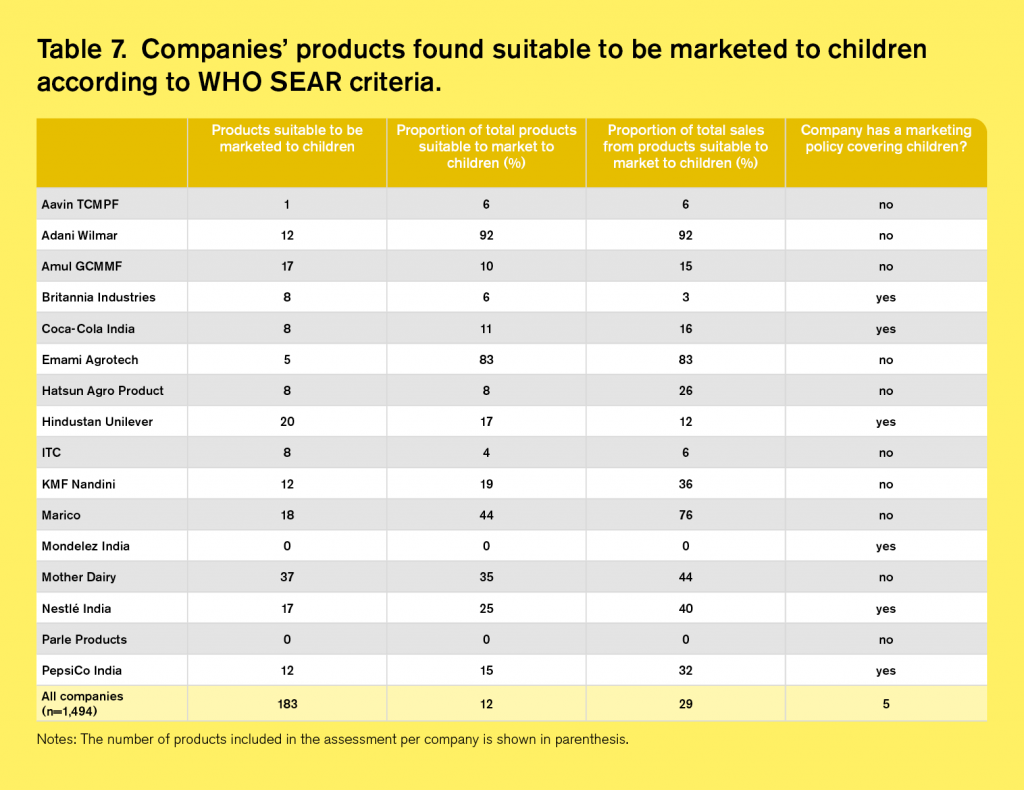
Figure 2 provides an overview of the percentage of products researched that were found suitable to be marketed to children for each company. The results of this assessment are impacted by the number of products in the analysis (in brackets), as well as the quality of nutrition information available.
The companies with the overall highest proportion of products suitable to be marketed to children are Adani Wilmar, with 12 out of 13 products found to meet WHO SEAR criteria, and Emami Agrotech, with five out of six products meeting the criteria. For both companies, only a limited number of edible oil products were assessed.
Only three out of the 16 companies in the Index, were found to have a considerable proportion of products suitable to be marketed to children (more than half the products in their portfolios meeting WHO SEAR criteria), with Marico improving performance when applying sales-weighting. This confirms, as Category B also highlights, there is ample scope for companies to focus more on changing their portfolio to offer healthier products.
More details on the methods, results, and limitations of the Product Profile study are available in the report by ATNI’s research partner, The George Institute for Global Health.
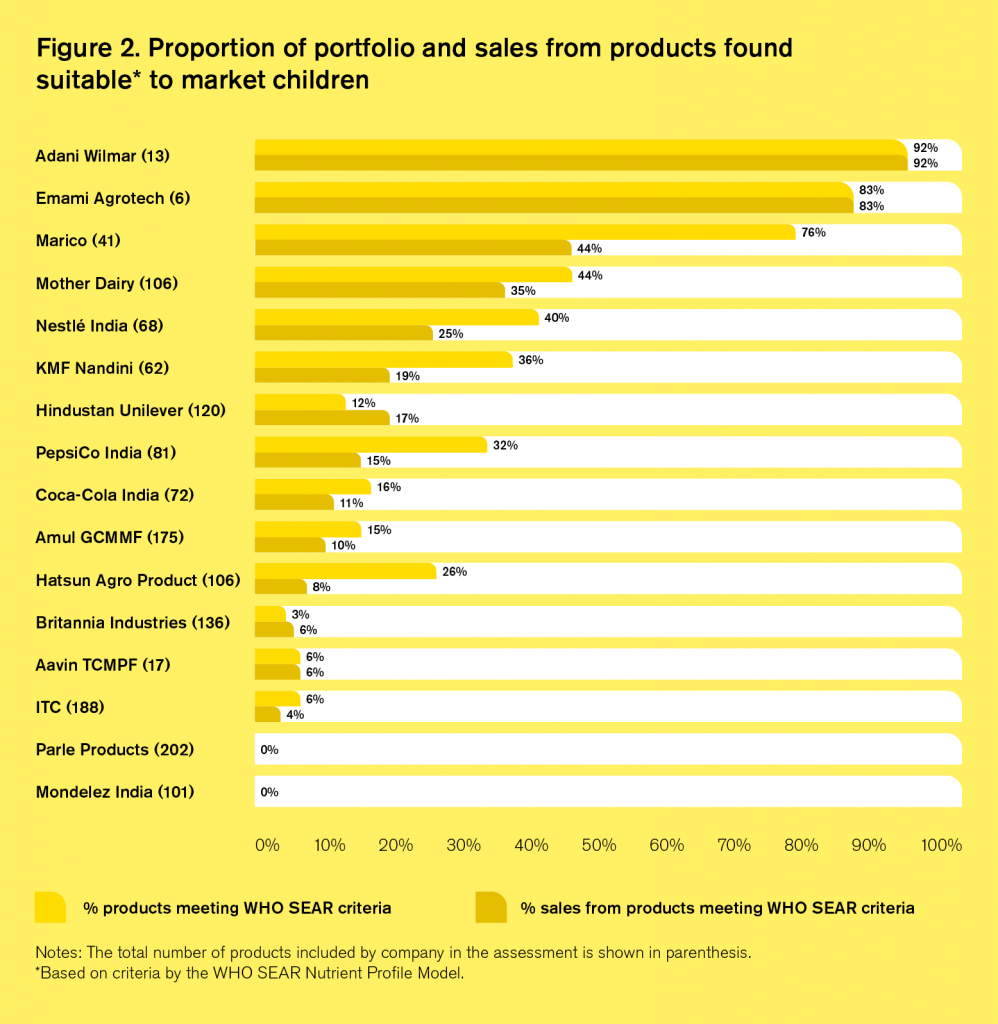
To improve and accelerate their efforts to support all Indian consumers, especially children and teenagers, to make healthy choices, food and beverage manufacturers in India are encouraged to:
- Make a commitment not to market/advertise products to children and teens at all or to only market foods and beverages that meet specific nutrition criteria, preferably established by independent national or international bodies, for example, the WHO SEAR nutrition criteria.
- Improve disclosure of nutrition information and report on relevant metrics so that stakeholders can have a better understanding of performance.